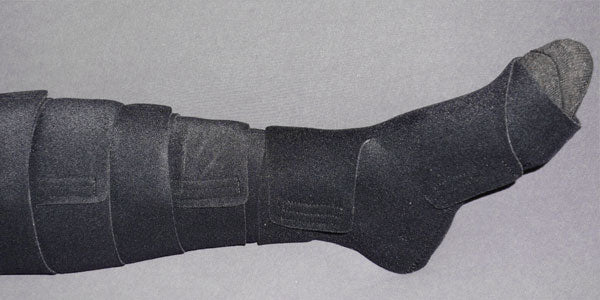When gout flares up, it can be extremely painful and debilitating - and with cases on the rise across the world, identifying effective solutions and management techniques remains overwhelmingly important. Yet, with no cure for the arthritic condition, what can be done to soothe the symptoms of gout flare-ups?
In this article, we're taking a closer look at compression techniques to understand whether compression is good for gout. But first of all, let's familiarise ourselves with the basics.
What is Gout?
Gout is a common type of arthritis that affects the joints. It is caused by a build-up of uric acid in the blood which, over time, can lead to the formation of sharp crystals in the joints. When gout flare-ups occur, these crystals can cause severe pain in joints around the body, including the ankles, toes, and knees; however, gout is most often associated with extreme pain in the big toes.
In addition to painful joints, gout can also cause swelling, redness, and warmth around the affected area. These symptoms often come on suddenly and can cause severe debilitation, causing patients to become immobile - especially without treatment. Over time, gout can lead to significant damage to the joints, which can worsen future symptoms.
Current treatments for gout focus on symptom management and prevention of flare-ups. These may include painkillers to ease pain during a gout attack, supplements to reduce uric acid in the blood, and diet changes to reduce purine intake.
What is Compression Therapy?
Compression is often recommended, alongside other treatment approaches, for the management of arthritic conditions. For example, many patients with arthritis in the hands may benefit from wearing compression gloves. This may make you wonder: Is compression good for gout?
In this context, compression refers to the act of applying inward pressure to a specific area. While compression gloves apply pressure to the hands, wrists and fingers, compression socks (depending on their length) can apply pressure to the toes, ankles, and the length of the calf.
Compression therapy is widely used to improve blood circulation - particularly in the legs. Some evidence suggests this approach can be beneficial for reducing pain and swelling and, in some cases, help to heal ulcers and wounds caused by blood pooling. In patients with arthritis, compression gloves may be prescribed to ease pain and reduce swelling associated with the condition, as well as to improve general function in the hands.
When it comes to gout, the most commonly used form of compression therapy is compression socks or bandages. These are widely available in most countries, but is there any evidence to support their effectiveness for gout?
Is Compression Good for Gout?
Some people may find that compression socks are effective at reducing the pain and swelling associated with gout by improving blood flow in the feet. They may also help by supporting the joints. However, others may find that added pressure to the affected area can have the opposite effect - particularly when concerning the big toe.
Furthermore, there has been very little research into the effects of compression on gout. For this reason, it is unlikely that compression will be recommended as part of gout management. Instead, the most effective ways to prevent and manage gout flare-ups tend to concern the diet - for example, drinking plenty of water and avoiding purine-rich foods - and pain relief - with over-the-counter painkillers, or in more severe cases, cortisone injections.
Conclusions
Patients experiencing gout may find that different treatment approaches are more or less effective for themselves than others. While the positive effects of compression have been well demonstrated in other treatment areas, the evidence of its benefits for gout is underdeveloped. Some patients may find compression useful during gout flare-ups or to prevent symptoms from worsening; however, others find that the pressure applied in compression makes painful symptoms worse.
It is always recommended that you speak with your doctor to identify the best treatment approaches for your circumstances. These will likely include diet alterations and the use of health supplements.






